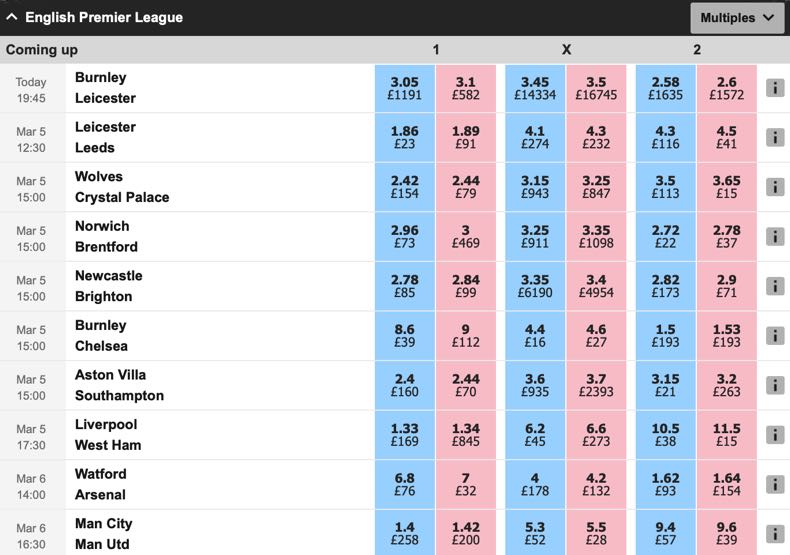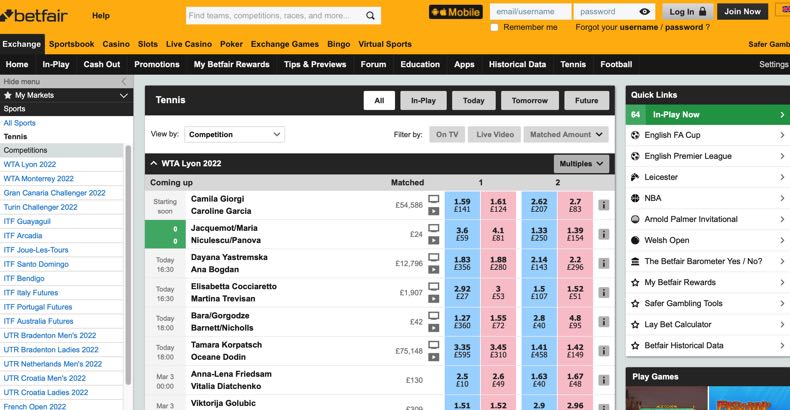 When betting exchanges were first launched at around the turn of the millennium, they were a revolutionary new concept. Rather than placing your bets with a bookie, why not cut out the middle man, who typically took a cut of around 20%, and bet against your peers, with the exchange taking a cut more like 5% – and only from winning bets? Exchanges took a long time to truly catch on, despite the promise of much better odds, the option to back and lay bets, a superior (at least then) in-play offering and the fact that you could never be banned or limited.
When betting exchanges were first launched at around the turn of the millennium, they were a revolutionary new concept. Rather than placing your bets with a bookie, why not cut out the middle man, who typically took a cut of around 20%, and bet against your peers, with the exchange taking a cut more like 5% – and only from winning bets? Exchanges took a long time to truly catch on, despite the promise of much better odds, the option to back and lay bets, a superior (at least then) in-play offering and the fact that you could never be banned or limited.
But catch on they did and before too long the leading player in the exchange world was handling more transactions every day than all the European stock exchanges combined, turning over billions of pounds of bets and winning countless awards. But how does the chief positive claim about exchanges actually stack up? In short, when it comes to fixed odds bookies and betting exchanges, which has the better odds?
Do Betting Exchanges Have Better Odds Than Fixed Odds Bookies?

Proponents of exchanges, most commonly the exchanges themselves, trumpet claims that they offer odds that are much better than you would find at a “normal” bookmaker. In general terms and in most of the major markets, this was undoubtedly true for many years. However, this new competition forced traditional bookmakers to improve their odds. This became even more the case as exchanges became more mainstream.
As an entire generation actually grew up with them as a standard alternative, rather than a confusing option that used strange odds and offered two sets of prices (which was how some punters initially viewed exchanges), bookies were seeing more and more of their customers turn to the exchanges. This forced them to reduce their margin and increase their odds and, anecdotally at least, the gap between the prices offered by a fixed odds bookie and the odds at the exchange narrowed. So, where do we stand now? Do exchanges really have better odds once the commission is factored in?
Variables & Options
In short, no single, simple answer can truly reflect the situation as there are so many variables and different options. At different times both leading exchanges and top bookmakers have made claims that they have the best odds. These are typically based on research the company in question has commissioned and have looked at a particular time frame and specific sports and markets only.
The fact of the matter is that if you want to always make your bets at the highest possible odds, you need to check each and every time. There are tools that make this relatively easy but this is the only way to ensure you get the best possible price. Quite simply, odds change and sometimes you might get the best price at an exchange, whilst at other times you might get it at a bookmaker. Check again half an hour later and the position might be reversed.
Here, of course, we are looking at just a single market. There are tens of sports, hundreds of contests and thousands of markets available to bet on every single day. If betting exchanges always offered the best odds on every single market and every single selection, all the time, bookies would soon go out of the business. (Or would they? See below.)
Who Generally Has the Best Odds?
If you are an extremely savvy, odds-conscious customer, we thoroughly recommend checking the prices at various sites, including exchanges, before you make a bet. However, many of us do not have the time or inclination for such things. If you are a typical, recreational punter who likes the fun of having a bet, be that almost every day, a few times a week, or even less often, you might simply want to pick one or two betting sites and make all of your bets with them. If that is the case, which generally has the best odds?
Again, in truth, there is no straightforward answer because much is still going to depend on what you like to bet on, both in terms of sports and in terms of markets and also, perhaps most crucially, in terms of odds. That said, given we have just painted a picture of Bob Smith, a decidedly average punter who likes a flutter for fun, let us assume that we are talking about a fairly typical mix of UK sports.
If we consider a fairly normal punter in the UK they probably tend to bet on football more than anything else, in particular the Premier League and the Champions League. In addition, they probably have a bet on some of the bigger horse races, the odd bit of rugby and the big events in tennis and golf. So, should they use an exchange or a fixed odds bookie?
The Exchange Wins (Probably)

If we are really pushed to give an answer to this question then we would cautiously side with the exchanges. We would have to insert a caveat that there really can be so much variation and so much does depend on timing and what markets you want to bet on. However, most betting experts would probably agree that in general terms, after their commission, exchanges deliver slightly better odds overall as compared to any other single rival.
This latter point is important because if you are looking to make your bets with just one or two sites, it would not really be fair to compare the two or three main exchanges with the 50+ fixed odds bookies. Instead, we should make a comparison between just one exchange and one bookie. And in this scenario, we feel confident that the exchange would win, probably offering odds typically around 5% bigger (even allowing for the standard 5% commission).
However, unscientific as it may be, we are going to conduct our very own odds comparison, selecting a range of bets that our fictitious punter Bob Smith might place. Here we will look at the world’s number one exchange and compare it with around 20 of the leading UK bookies, taking the fixed odds sites as a collective, single entity. We are skewing the odds somewhat towards them but how will the exchange cope?
| Sport | Match/Event | Bet | Best Bookie Odds | Post-Commission Exchange Odds |
|---|---|---|---|---|
| Football | Liverpool v Leeds (EPL) | Liverpool to win | 1.20 | 1.19 |
| Football | Liverpool v Leeds (EPL) | Correct score 2-2 | 26 | 30.45 |
| Football | Atletico Madrid v Man Utd (UCL) | Man Utd/Man Utd (HT/FT) | 4.8 | 5.47 |
| Horse Racing | 19.00 Kempton | Tyger Bay to win | 4.5 | 4.8 |
| Horse Racing | 20.00 Kempton | Fighting Poet to win | 81 | 199.55 |
| Tennis | Djokovic v Vesely | Vesely to win | 15 | 14.78 |
| Golf | Honda Classic | Brooks Koepka to win | 21 | 23.8 |
Note that odds are rounded to two decimal places and are quoted in decimals for ease of comparison. Results are for indication only and compare one exchange with the best odds available from various major UK bookies at the time of research. Exchange odds assume a base commission of 5%.
As the table above shows, sometimes the exchange will offer the best odds and sometimes a fixed odds bookie will (especially if you compare odds among different bookies). Out of seven bets we selected entirely at random, there were two very narrow wins for the traditional bookies, four larger wins for the exchange and one occasion where the exchange really blew the bookies out of the water.
In General, Exchanges Best for Outsiders
Whilst the table above shows the bookie actually offering higher odds than the exchange for world number 121 Jiri Vesely to beat Novak Djokovic, in general, outsiders at long odds tend to be the time when it most pays to opt for the exchange. This makes sense for a couple of reasons.
First, the most money is wagered on favourites and on the biggest sports and events. Therefore bookies want to get a slice of that pie and they know they must make their odds more competitive. Second, research has shown that people’s grasp of probability is basic, at best. If an event has two or three possible outcomes and these are all priced fairly evenly, your average punter can far more easily understand the odds, probabilities and relationship between the two. However, in a horse race with 16 runners, things are far harder.
At the same time, understanding the difference between 60/1 and 80/1 is more difficult than between evens and 2/1. In addition, generally speaking, punters backing selections at such big odds are less concerned about value and more about just landing a big win. As such, the bookies feel they can offer comparatively worse odds on outsiders and still attract business, this combination of factors meaning their margins can be much bigger than is possible in more competitive, more easily comprehended markets.
As our Djokovic case shows, this may not always be the case. However, if a lot of your bets are on horses at double-digit odds, correct scores in football, outright tournament bets in golf and other similar markets, you may well find substantially better prices at the exchange. In contrast, fixed odds sites will tend to be far more competitive on football match odds (in the most popular leagues), both teams to score and other similar, favoured mainstream markets at relatively short odds.
Impact of Commission on Exchange Odds
As stated, our table above has deducted the exchange commission at a rate of 5% to give you the effective odds and, thus, a fair comparison. To expand on this, the table below shows the impact of 5% commission, and separately 3% commission, on a range of different odds.
| Odds Before Commission | After 5% Commission | After 3% Commission |
|---|---|---|
| 1.20 | 1.19 | 1.19 |
| 1.60 | 1.57 | 1.58 |
| 2.00 | 1.95 | 1.97 |
| 3.50 | 3.38 | 3.43 |
| 6.00 | 5.75 | 5.85 |
| 10.00 | 9.55 | 9.73 |
| 20.00 | 19.05 | 19.43 |
| 50.00 | 47.55 | 48.53 |
Liquidity Can Be an Issue

At a fixed odds bookmaker, any market they offer will allow a customer to stake a reasonable sum (assuming they are not subject to limits for whatever reason). At some sites, the maximum stake will be made clear when you try to make a bet and for most customers, most of the time, wagering as much as they want will not present a problem. In contrast, you can only make a bet at an exchange where there is liquidity available.
Liquidity is the term used to describe money available at an exchange on a given bet or market. In order for one person to place a back bet, there must be someone prepared to lay the same bet. On less popular markets, smaller sports and less important matches, games or tournaments, a lack of liquidity can seriously impact your ability to make bets at the exchange.
Arsenal vs Wolves Example
As we write this there is almost £10,000 available at the best odds to back Arsenal in a Premier League game against Wolves. In contrast, on that same game, the majority of players have zero liquidity in the far less popular anytime assist market. One player that does have money available to back is Emile Smith-Rowe but he is only being offered at odds of 4.0. At the same exchange’s fixed odds sister site, you can back the young Gunner at a price of 4.5 instead.
Where there is little liquidity, punters face three related problems. First, they may not be able to place their bet at all. Second, they may not be able to place as big a bet as they would like and third, the odds may be poor because the only people trying to lay the selection are attempting to do so at odds lower than they know they can back that same selection elsewhere.
What can exacerbate this issue somewhat for fans of exchanges is that liquidity tends to be more limited on the sorts of outsiders that can offer the biggest prices at the exchange. Much will depend on just how niche your sporting bets are but there is no doubt that a lack of liquidity can sometimes mean the exchanges are found wanting.
Exchanges No Good for Accas & Builders
Another area in which exchanges do not offer the best option is when it comes to more complex bets with various propositions. Exchanges have dabbled in trying to offer accumulators and other similar bets but without a great deal of success. At best, you may find that a small number of pre-selected accas are available but if you regularly like placing this type of wager then an exchange is certainly not the place to try and do it.
In addition, the ever more popular bet builder style of bet is not something you will be able to back on the exchange. If that is your bet of choice, fixed odds is pretty much the only way to go, though an exchange may have options if you only want to back two or three different options, such as the match result and over 2.5 goals.
Bookies Tend to Have More Offers

Last of all it is worth noting that even for a shrewd punter who considers value and the bottom line to be the ultimate measure of a site’s worth, fixed odds bookmakers may have more to offer even if the bare numbers of the odds don’t quite stack up. That is because the exchange model, with small margins and bets being made between punters, lends itself less well to offering free bets and promotions.
The exchange may have better odds on a given team to win a game of football but perhaps the bookie has an early payout promotion if the side goes two goals up. Or maybe they payout if they are leading with just a few minutes to go. In the rare situation where a side blows the two-goal lead or the opponent gabs a late equaliser, your bet at the exchange would lose but at the bookie, it would be a winner. Bigger odds are no good if you don’t win and just one full payout would compensate for a lot of times where the exchange offered only marginally better prices.
Whether the offer is for money back, boosted odds, an early payout or anything else, quite simply, the best fixed odds bookies have more promotions than the best exchanges. Whether this is worth more than any odds superiority is hard to quantify but on any given wager, the most serious punters should consider the full package being offered by both options.
